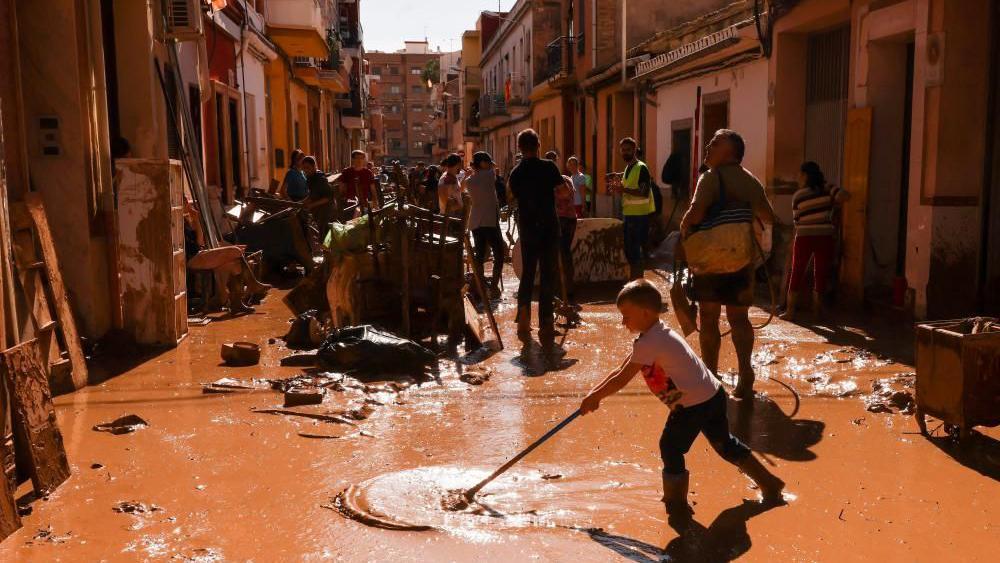In the wake of devastating flooding in Valencia, Spain, 500 additional soldiers are being deployed to assist with ongoing rescue and recovery efforts. This region has been particularly hard hit, with over 200 fatalities reported, most occurring in and around Valencia. As authorities continue to assess the devastation caused by the heavy rains that began earlier in the week, further increases in the death toll are anticipated. The floods have not only destroyed local infrastructure, including bridges, but have left many communities isolated, without vital necessities like water, food, and electricity. As residents mobilize to aid in cleanup, officials have announced restrictions on traffic to prioritize access for emergency responders dealing with the crisis.
With around 1,700 soldiers already engaged in search and rescue operations, the influx of new troops aims to enhance the operation’s efficiency, bringing in additional heavy machinery and resources that are desperately needed. Efforts are concentrated on pumping water from underground areas where individuals may have become trapped as flooding escalated. The situation remains dire, and hope of finding survivors is fading as the days progress. Local journalist Paco Polit has highlighted the importance of the reinforcements, emphasizing how the machinery will assist in organizing restoration efforts in the places hardest hit by the deluge.
Local authorities face increasing backlash over their slow response to the flooding and inadequate prior warnings. Residents like Amparo Andres have expressed deep frustration, recounting their horrific experiences as floodwaters surged uncontrollably into their homes and businesses. Andres articulated the tragic loss of her life’s work, stating that while she is grateful to be alive, her losses feel insurmountable. Similarly, Juan Pérez described the erasure of his family memories and heritage due to the flood’s destruction, indicative of broader emotional devastation felt across the populace. Resident Juan González voiced outrage at the lack of preventive measures taken by local government, highlighting a feeling of betrayal among those affected by the disaster.
In the town of Paiporta, which has reported more than 60 fatalities, residents are critical of the slow aid response. Local pharmacist Paco Clemente pointed out that emergency resources like firefighters and equipment have been insufficient. Moreover, criticism is also directed at the federal government in Madrid for its delays in mobilizing military aid and for declining offers for outside support, such as firefighters from France. Despite these criticisms, Prime Minister Pedro Sanchez has assured that the government will fully commit to assisting those impacted by the flooding.
On the ground, a notable wave of solidarity has emerged as volunteers—many of them young people—organize through social media to pitch in with clean-up operations. The collective effort illustrates a strong community spirit, with many determined to confront the aftermath of the flooding head-on. However, the response from local authorities has been criticized for its limitations, and the need for systematic organization has become evident as volunteers attempt to reclaim their communities. To facilitate emergency support, traffic would be restricted in the Valencia metropolitan area to ensure that essential resources can continue to flow.
As the floodwaters recede, the extent of the damage becomes clearer. The devastating rainfall comes on the heels of a notably dry year, which rendered the ground less capable of absorbing the sudden influx of water. Some areas experienced a staggering amount of rain in just a matter of hours, overwhelming local drainage systems. Climate change also looms as a significant factor, with preliminary studies suggesting that this extreme weather event may have been exacerbated by global warming. Scientists from World Weather Attribution have indicated that the rainfall experienced could be up to 12% heavier as a result of these factors, highlighting the urgent need for addressing climate impact in disaster preparedness and response strategies. The confluence of these factors underscores a pressing need for improved disaster management frameworks to better anticipate and mitigate the effects of future extreme weather events.

